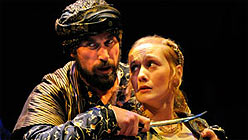Mary Zimmerman’s brilliant and hilarious The Arabian Nights, now playing at the Berkeley Rep, is a terrific capper to a tumultuous political year. Iraq was explicitly on Zimmerman’s mind when the play was first performed in 1992. Back then, the callous boast of a US military official to bomb Iraq “back to the Stone Age” during the previous year’s Gulf War compelled Zimmerman to focus her piece on the humanity of an enemy that had been systematically dehumanized so that its suffering would be more palatable to a US audience watching the carnage on TV. Today, Iraq has receded into the background somewhat as people’s 401Ks have been decimated. But the prospect of the eventual removal of our troops from Iraq seems, at last, to give us permission to be moved by a beautiful piece of theater set in Baghdad, to laugh at its fart jokes, to gasp at the poetry of its passages lifted from the Qur’an.
The source for Zimmerman’s play is The Book of the Thousand Nights and One Night, translated in 1923 by Powys Mathers. Zimmerman borrows freely and subjectively from the stories contained therein, stories spun by the clever Scheherezade (Sofia Jean Gomez) to keep the gleaming knife of frozen-hearted King Shahryar (Ryan Artzberger) from slitting her virgin throat. Within this story of a woman who must tell stories to save her life are more stories still, some told by characters who must themselves tell tales to save their own necks (or, in the case of the four suitors of a jester’s adulterous wife, their balls).
Zimmerman tends to work with many of the same actors and technicians from show to show, which is why, I suspect, the audience feels so well cared for in this exceptionally staged and beautifully acted production. We are in extraordinarily capable hands. In scene after scene, story after story, cast and crew alike rise to the occasion, getting belly laughs when the moment requires it or stunning us into silence with prose poems of loss and love. You sense that the play works so well precisely because the demands on the actors and technicians are so high. For example, all of the actors play more than one part, even if it’s just to take ensemble duties for a scene or two. Without exception, they bring equal measures of passion and animation to their various roles, be they large or small.
Beyond its emotional requirements, the play is physically demanding — at some moments the actors are writhing on the floor in choreographed love making, other times they assume the forms of pantomime beasts of burden to bear each other about the stage, and throughout the performance, cast members are called upon to muscle the numerous pieces of the portable set into position around the patchwork floor of rolled-out Persian rugs, without the assistance of formal scene changes and furtive stagehands scurrying about in the dark. Some play instruments, most sing. The result is magic.
And the demands don’t end there. On each night a different pair of actors is selected at random to improvise one scene. On the night I attended, Allen Gilmore (who was terrific last summer in Bach at Leipzig at Shakespeare Santa Cruz and is equally marvelous here as Scheherezade’s father, the aforementioned jester and numerous other parts) and Ari Brand (I especially liked him as the boy who literally goes blind when his love leaves his side) took turns describing the contents of a bag that they both claim to own. At times they were cracking up their colleagues on the stage, which did not feel at all unprofessional. Rather, it was a moment when actors and audience were entirely in synch, each enjoying the same spectacle and letting, if only for a bit, the barriers between seats and stage fall away.


